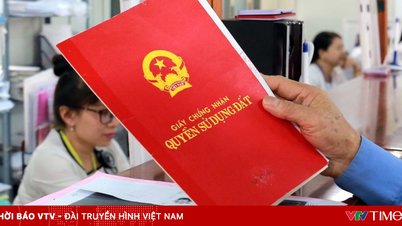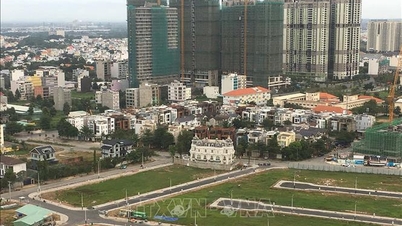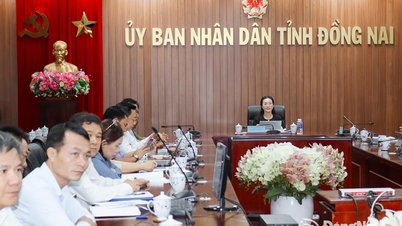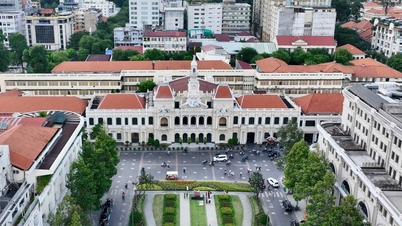
In the revised contents, many issues related to land finance and land prices are proposed to be adjusted - Photo: NGOC HIEN
According to the Ministry of Agriculture and Environment , the amendment of the 2024 Land Law aims to promptly resolve urgent issues arising from practice, remove institutional "bottlenecks", and contribute to promoting socio-economic development.
Adjusting regulations on land prices
In the draft proposal to amend the law, the Ministry of Agriculture and Environment said that the amendments and supplements to the Land Law include 68 articles, divided into 3 groups of contents. Among them, there is a group to remove obstacles when implementing the law and a group of adjustments to suit the 2-level local government model.
Notably, regarding land finance, the Ministry proposed amending Clause 10, Article 13 (stipulating the State's rights as the entire people's owner of land), in the direction of regulating the land price adjustment coefficient, the rate of land use and rental fees for each type of project, and the coefficient of infrastructure cost deduction when implementing the project.
Amend and supplement Article 158 in the direction of amending the principles of land valuation, input information for land valuation according to land valuation methods; supplement the regulation assigning the Government to specify in detail land valuation methods.
Amending Articles 159 and 160 of the Land Law in the direction of using land price tables to calculate land use fees and land rent when the State allocates land, leases land, changes land use purposes, and recognizes land use rights; at the same time, to calculate related taxes and fees, determine the rights and obligations of land users, as well as calculate compensation when the State reclaims land.
The land price adjustment coefficient is the rate of increase or decrease according to the area and location stated in the price list to adjust the annual price. This coefficient can be amended and supplemented during the year.
Provincial People's Committees are authorized to promulgate land price adjustment coefficients applicable from January 1 every year, starting from the year following the 5-year period of the land price list.
The Government will provide detailed guidance on the process of developing and promulgating this coefficient. In particular, related tax policies will be adjusted in tax legal documents.
Amend and supplement Articles 161 and 162 to clearly stipulate the content related to land price adjustment coefficient.
Expanding land acquisition area
Regarding the planning system and land use plans, the Ministry of Agriculture and Environment proposes two options:
Option 1: Replace district-level land use planning and plans with commune-level land use planning and plans. Option 2: Do not prescribe commune-level land use planning and plans.
Regarding land acquisition, compensation, support, and resettlement when the State acquires land, the draft adds two cases:
Firstly, land recovery to implement projects with special requirements on investment locations; urgent projects serving political and foreign affairs tasks; projects in free trade zones, international financial centers, logistics, urban, tourism, and commercial projects...
Second, in the case of using land to implement socio-economic development projects through an agreement to receive land use rights, but the term (including extension) has not yet been agreed upon.
If the investor has reached an agreement on more than 75% of the area or with more than 75% of the land users within the project scope, the State will reclaim the remaining area to allocate or lease land to the investor.
Notably, the draft law also removes a series of regulations related to sea encroachment activities in the direction of not stipulating areas where implementation must be approved by the National Assembly and the Prime Minister, and investment policy decisions must be made.
In addition, the draft law also supplements regulations on land allocation, land lease, permission to change land use purposes, completes the national land information system, land database, amends regulations on land recovery, compensation, support, resettlement, etc.
Amending the law to suit the 2-level local government model
The Ministry of Agriculture and Environment said the amendments and supplements to the Land Law are aimed at conforming to the two-level local government model, mainly legalizing the contents that have been decentralized, delegated, and determined in the land sector.
These contents include: authority to approve provincial land use plans; authority to allocate land, lease land, permit conversion of land use purposes and forms, approve land use plans, extend land use; authority to recover land, compensate, support resettlement; land registration, grant certificates of land use rights and ownership of assets attached to land.
Source: https://tuoitre.vn/sua-luat-dat-dai-2024-dieu-chinh-loat-quy-dinh-ve-tai-chinh-dat-dai-dinh-gia-dat-20250728224758345.htm


![[Photo] Prime Minister Pham Minh Chinh chairs a meeting of the Government Standing Committee to remove obstacles for projects.](https://vphoto.vietnam.vn/thumb/1200x675/vietnam/resource/IMAGE/2025/10/06/1759768638313_dsc-9023-jpg.webp)
![[Photo] Prime Minister Pham Minh Chinh chaired a meeting of the Steering Committee on the arrangement of public service units under ministries, branches and localities.](https://vphoto.vietnam.vn/thumb/1200x675/vietnam/resource/IMAGE/2025/10/06/1759767137532_dsc-8743-jpg.webp)


































































































Comment (0)